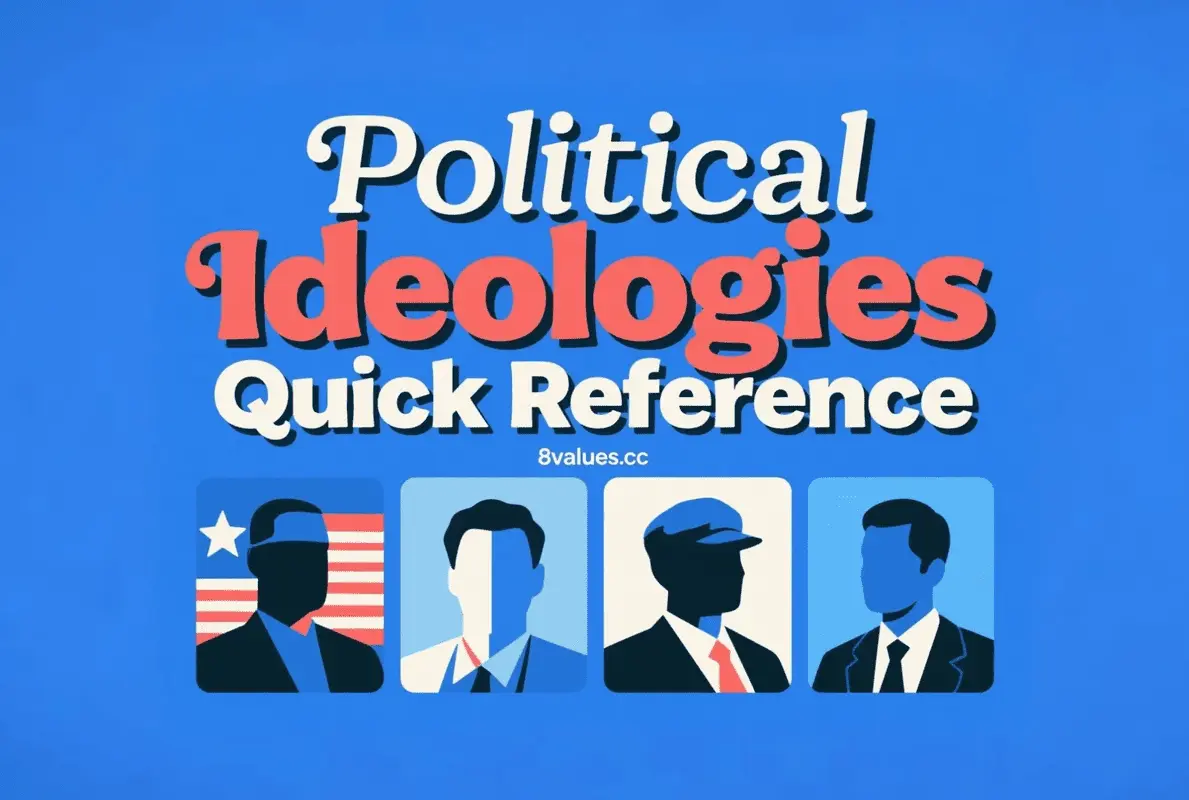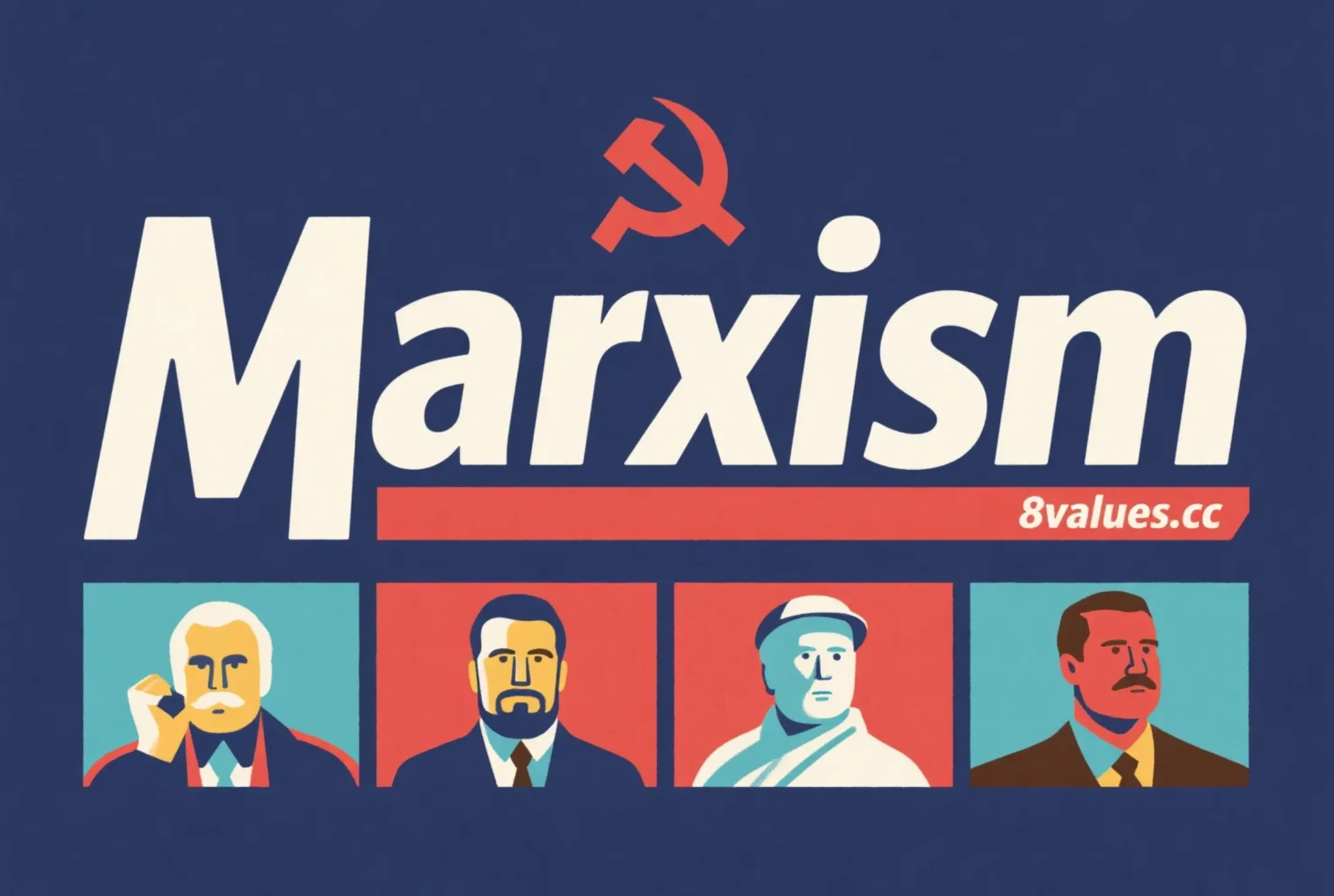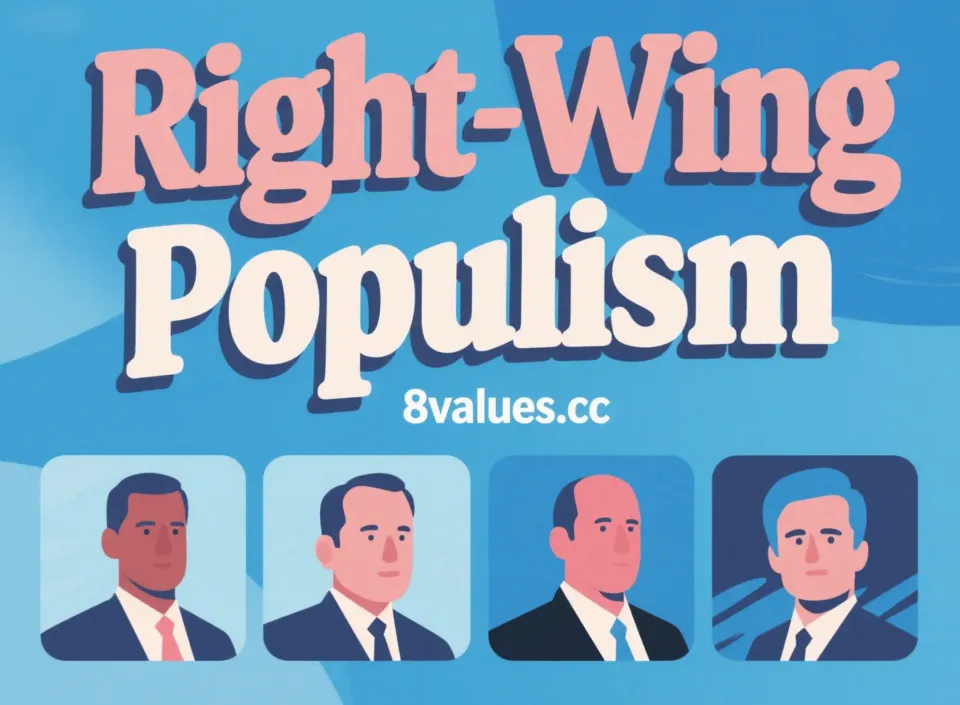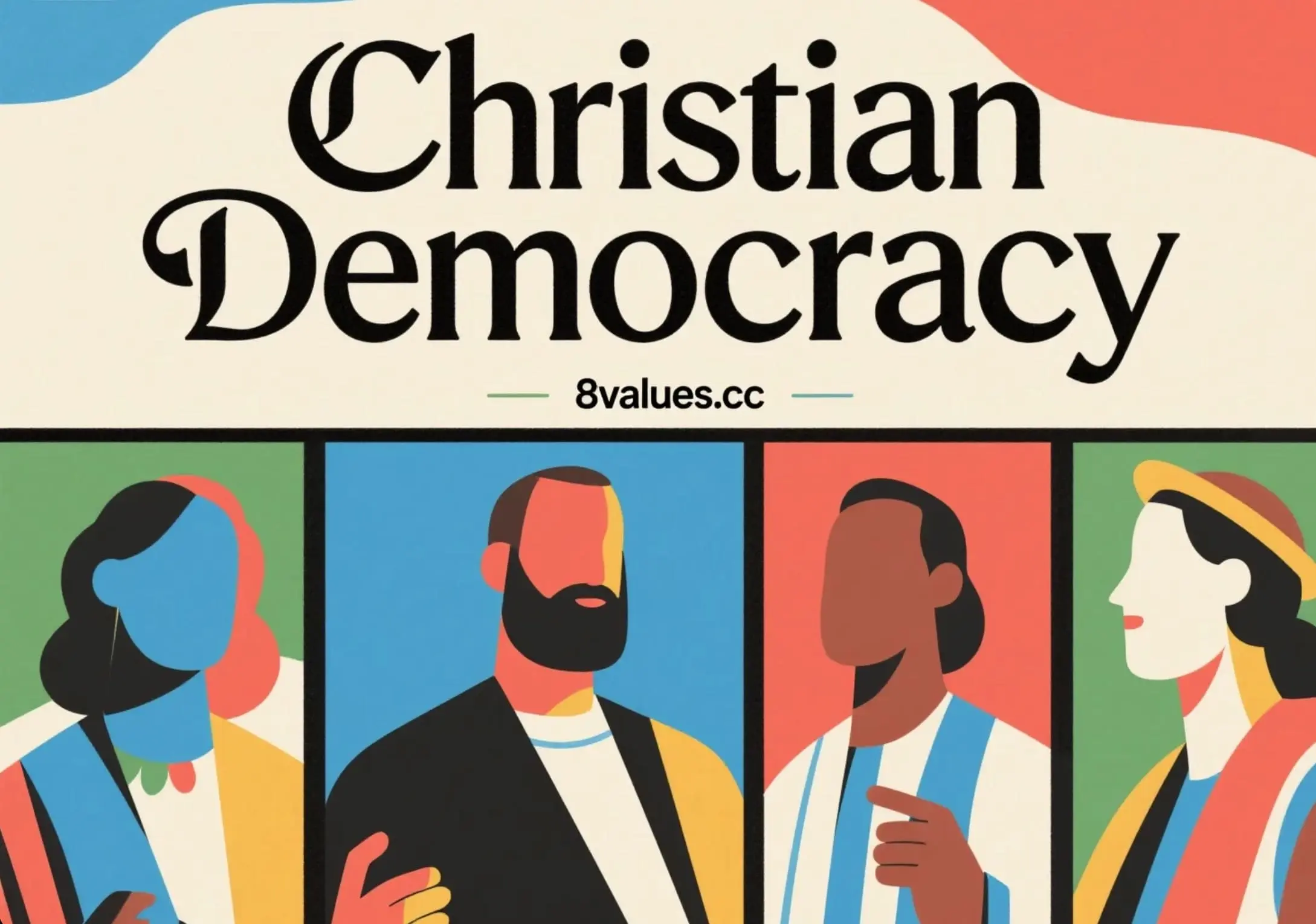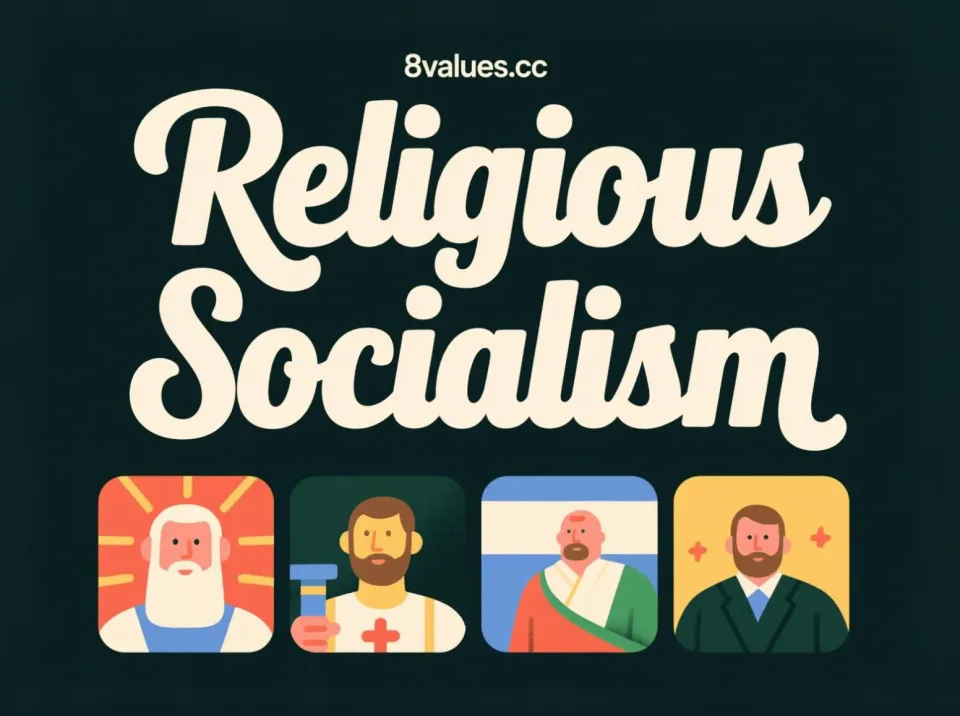The Genealogy of Political Thoughts: A Comprehensive Guide to Multiple Ideology and Basicism in Politics
Deeply understand mainstream and marginal political ideology, and explore core values such as conservatism, liberalism, socialism, and fascism. Through the 8values test, discover your political spectrum coordinates to help you better understand political science and social systems.
The political world is complex and understanding the driving forces behind it is crucial to grasp social development and personal choices. Various political ideologies form the basis for our understanding of the world and organizational society, and profoundly influence our legal, economic and daily life. This article will take you to explore a series of important political ideologies, from tradition to modern, from mainstream to marginal, and help you better understand the diverse trends of thought in contemporary society. If you are curious about your political leanings, you might as well do a fun test with the 8values Quiz website to explore where you are on the political spectrum.
Conservatism and the persistence of traditional values
Conservatism , as the name suggests, aims to uphold traditional values . In Western culture, conservatives often advocate nuclear families, organized religion, military and property rights . They believe these are the cornerstones of social stability and strive to protect them.
Liberalism: The dominant force in modern society
Liberalism is often considered to be the dominant ideology in modern history. It attaches great importance to the rights of each individual , believes that the government must obtain the approval of its people and that everyone is equal before the law . Liberalism also supports free markets, multi-party elections , separation of power among government departments, and separation of church and state . Furthermore, it emphasizes a set of basic values written into the Constitution, as well as privacy, freedom of speech, freedom of press, freedom of assembly and freedom of religion .
Moderateism: The middle way to seek political balance
Moderateism tends to remain within the so-called "Overton's Window", the politically acceptable scope of policy for mainstream people . In most cases, moderates are detached from politics, which means they don’t care much about politics, but they know a little about it.
Capitalism: Private ownership and profit-driven economic system
Capitalism is an economic system based on the private ownership of the means of production and its operation for profit . The core characteristics of capitalism include private property, free exchange, competition, division of labor and social cooperation .
Socialism: Workers' pursuit of all and social fairness
Socialism is a broad term that covers many types. In the classical sense , socialism describes the means of production owned by workers and strongly supports workers' coups, democracy and workplace democracy . In modern times , socialism advocates workers' democratic autonomy, imposes high taxes on the rich, and nationalizes key industries . One of its core values is social ownership .
Syndromeism: Social change through workers' actions
Syndromeism is a branch of socialism, which believes that the best way to achieve a socialist society through unification of the labor force, the establishment of locally dispersed revolutionary workers' organizations (called syndromes) and the advancement of workers' demands through strikes and direct actions . Once a post-capitalist society is realized, a congress or commune composed of trade unions or fields in the economy will be created to represent the numerous trade unions or fields in the economy and form a central government.
Communism: a classless and selfless social vision
The core of communism is the common ownership of means of production, distribution and exchange , and the distribution of products according to the needs of everyone in society. A communist society has no private property, social class, money or state .
Corporate ethos: Cross-class cooperation in managing the economy
Corporate ideology advocates organizing society into different employment areas, such as agriculture, military, engineering, etc., to which people are assigned according to their interests and skills. It believes in a system of inter-class regulatory in which workers, employers and states negotiate with each other to operate the economy most effectively and theoretically satisfy the interests of all parties involved. It is worth noting that it does not refer to a political system dominated by large commercial interests, which would be chaebol rule.
Libertarianism: The ultimate individual freedom and limited government
Libertarianism regards freedom as its core value and strives to maximize autonomy and political freedom . It advocates very limited government and believes in the same principles as liberalism, such as equality before the law and the fundamental rights of life, freedom and property .
Separatism: Establishing Sovereignty in Independent States
Separatism , also often referred to as separatism , aims to establish a nation, state, sovereign state or government independent of the existing state .
Feminism: Social movement for gender equality
Feminism aims to define and establish gender equality in politics, economy, personal and social . It argues that society prioritizes the male perspective, in which women are treated unfairly. Efforts to change this include opposing gender stereotypes and improving women’s educational and career opportunities .
Anarchism: Anarchism’s vision for a free society
Anarchism is an ideology that advocates a society without rulers or established authority , with a focus on the concept of freedom . It advocates replacing the state with a stateless society and a voluntary freedom union .
Environmentalism: Incorporating nature into public policy considerations
Environmentalism , sometimes called green politics , is a term used to represent a range of ideologies that collectively believe that nature should be an important factor in the formulation of public policies . Whether it is increasing recycling, reducing carbon dioxide emissions or preventing water pollution , it belongs to its scope of concern.
Populism: representing the masses and challenging the elite
Populism focuses on attracting a large number of people and their emotions , believing that "what the masses want is what the masses get." It comes in many forms because its only condition is that it represents a movement made by the people for the people . This leads to no real political affiliation. Because of its reliance on people’s support, it is often associated with democracy. It often opposes the people with the elite and is frequently anti-establishment and anti-political .
Republicanism: a non-hereditary system of civil power
Republicism is an ideology centered on a non-hereditary government system , which opposes monarchy and gives political power to citizens of republican countries .
Progressiveism: Embrace social progress and challenge old traditions
Progressiveism believes that legacy originating from the past should not be sacred, but should be regarded as second to social progress . It is basically the opposite of conservatism .
Imperialism: Historical thoughts on expanding national power and influence
Imperialism traditionally believes that a country should expand its power or influence through military actions . It was once very popular and considered a type of moderateism, but its popularity has been much worse than before over the years. Imperialism is known for its war advocacy and belief that strong nations should rule weak nations . It often defends itself by insisting that the colonized people benefited (as wealthy countries help them and provide what they usually don’t have access to) and refutes allegations of oppression .
Equality: The universal principle of social equality
Equality is a school of thought built on the concept of social equality that prioritizes social equality for all. Therefore, all citizens of a country should enjoy equal rights and treatment under the law.
Transhumanism: Technology upgrade, pursuit of immortality and ultimate mind
Transhumanism believes that everyone should upgrade themselves with technology to overcome the most basic and complex challenges of human beings. The ultimate goal is to enable all to achieve eternal life and have an incredibly advanced mind and body .
Communityism: Community welfare is higher than absolute individualism
Communityism is an ideology that emphasizes the well-being and importance of community as a major social unit. It often emphasizes that the left and right binary opposition in politics is hindering political development and believes that policies at both ends of the spectrum are complementary and necessary to benefit the community. It considers it harmful when absolute individualism conflicts with the public interest .
Authoritarianism: Centralized and limited freedom forms of government
Authoritarianism is a form of government characterized by strong power (usually central power) that requires obedience to authority and limit political and civil liberties . For example, most classic monarchies are a form of authoritarianism. The rulers of authoritarian states imprison and persecute their opponents .
Fascism: State supremacy and extreme authority to suppress dissent
Fascism believes that people are weak when they are divided, but powerful when they are united under a banner (whether it is a country, a nation, a military or anything like that) . It is an authoritarianism , which means it is characterized by a controlling government that rejects the notion that people can vote among multiple political parties . It involves a strong central power , usually referring to a dictator , and therefore it refuses to separate powers . Fascism is also extreme nationalism , a belief that as long as it is beneficial to itself, the state should not care about the rights of other countries. Extreme nationalism usually coexists with militarism , the idea that a country should have a strong enough military to expand its national interests and values . Fascism uses coercive means to suppress the opposition . It believes in the natural social hierarchy and advocates the rejection of personal interests for the common good of the state or race .
Nazism: Racism and the Extreme Fascism of Eugenics
Nazism is a form of fascism, with its core being a racist ideology that believes that the Aryan race is superior . It believes that the Aryan race should rule the rest of the world to make it better and therefore extreme nationalism . To be considered Aryan, according to the Nazi classification, you must be white, heterosexual, physically and mentally sound, non-cowardly and non-Jewish . If you are considered non-Aryan , you will be called "Untermensch", meaning inferior people . It also advocates eugenics , a range of beliefs and practices designed to improve the genetic quality of the human population. Therefore, people with genetic diseases are considered "useless food" and are killed on the spot or sent to concentration camps because they are considered "a life that is not worth living." Nazism also hates homosexuals and believes that they are also "inferior nations."
Conclusion: Understand the diverse trend of thought and explore self-political tendencies
Political ideology forms the basis for our understanding of the world and organizational society. They have a profound impact on our legal, economic and daily life. Understanding these diverse ideas will not only enhance our understanding of history and current affairs, but also help us better position ourselves. Regardless of your political inclination, continuous learning and critical thinking are crucial.
Want to know which ideology your own political inclination is closer to? Visit 8values Quiz for testing now and learn about your position in the political dimension with 8values political spectrum analysis ! In addition, the 8values ideological list provides a detailed introduction to all 52 test results, and the 8values blog has a variety of classic content, giving you a deeper understanding of various political philosophy.
